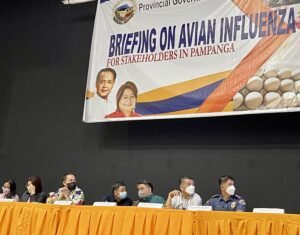
CITY OF SAN FERNANDO – The Department of Agriculture has reported the first outbreak of the highly pathogenic avian influenza virus, which affected at least three commercial farms in Pampanga and another in Bulacan province.
The DA confirmed on Tuesday that the disease, HPAI Type A subtype H5N1, was first detected on January 6, 2022 from a duck farm in Barangay Barangka in Baliuag town in Bulacan.
This was followed by reports on January 21, 2022 from two commercial quail farms in Brgy. Dalayap in Candaba, and on January 27, 2022, from a quail farm in Brgy. Mangga also in Candaba town. Some 37,723 quails died in the two areas.
The third case was reported on February 11, 2022, from two adjacent quail farms in Brgy. San Antonio in Mexico town, where some 4,522 quails have reportedly died.
The DA said that it has acted swiftly to contain the avian influenza (bird flu) through the Bureau of Animal Industry (BAI), respective municipal veterinary personnel, and farm owners. Respective municipal veterinary authorities promptly culled and properly disposed of all birds in the affected quail and duck farms.
“We immediately carried out the needed protocols to effectively contain the avian influenza that was detected in ducks and quails in Baliuag, Bulacan, and Candaba and Mexico in Pampanga — aimed mainly at preventing it from spreading to other areas,” said Agriculture Secretary William Dar.
Some 19,317 quails were culled in the two outbreaks in Candaba town while 9,768 quails were culled in Mexico town.
This is the first recorded outbreak of HPAI A (H5N1) in the Philippines. Previous outbreaks involved HPAI A (H5N6), a similarly highly pathogenic avian influenza subtype.
Meanwhile, in a bid to protect the multi-billion poultry industry and food security in Pampanga, Gov. Dennis ‘Delta’ Pineda gathered stakeholders on Monday to further control bird flu incidents in Candaba and Mexico towns since January.

“Lahat po tayo may papel para lalong ma-control and ma-save ang poultry industry natin,” Governor Pineda said in a briefing on avian influenza held a day after Agriculture Secretary Dar announced the successful control of bird flu among quails and ducks in Bulacan and Pampanga. Around 50,000 birds were culled by local governments.
Dr. Augusto Baluyut, provincial veterinarian, said the quick responses in 2017 and 2020 helped limit and eradicate the H5N6, a virus that affects birds only.
The virus H5N1was tested positive in quails and ducks for the first time in the two provinces although it had been detected since 1997 in many parts of the world, according to Dr. Glofezita Lagayan of the Bureau of Animal Industry.
Dr. Ida Gloria Felix, Department of Health, said there is “no known transmission of the H5N1 to humans or vice versa.”
The provincial action plan requires implementation of biosecurity and disinfection, isolation and quarantine, surveillance and reporting of incidents within 24 hours. The provincial task force consisting of Provincial Veterinary Office and BAI was placed on a 24/7 operations in an office at the Provincial Engineering Compound.
Gov. Pineda established control points by BAI and the PNP within one-kilometer of laboratory-confirmed farms. Big and backyard farms within the said control points must first present BAI-negative tests before their birds are allowed to be hauled outside of the control points.



